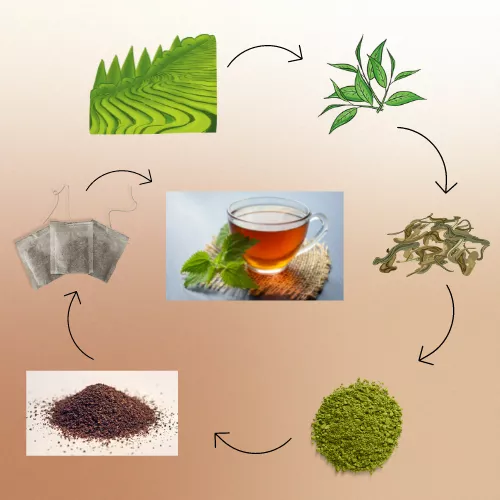Key difference: We will see the major difference between Coffee and Tea with a detailed explanation. Let’s see where we want to use the above two components in day-to-day life. Coffee and Tea are the most consumed beverages, used as substitute goods grown as Plantation crops. These goods are most commonly used in this world, cultivated, and used for drinking purposes.
The Scientific Name of tea is “Camellia sinensis” an evergreen shrub grown mainly for its leaves. The Scientific Name of coffee is “Coffea robusta” is a global commodity, and it is prepared from roasted coffee beans.
These are the common definition of these two plantation crops. We can see briefly below in this article.
1. She used to have coffee every day in the morning.
2. Adam will usually have fresh tea to make him refresh himself.
COFFEE

Coffee is the hot drink.
Coffee is the brewed beverage, the tropical evergreen plant, and the most profitable commodity, and it requires a subtropical climate. It needs a lot of relative humidity, sun, and shade. There are two types of coffee, one is “Coffea arabica” & “Coffee robusta“. It will be grown at lower elevations. It is mostly drunk in the United States and is now the most popular worldwide. Likewise, it is popular due to its high caffeine content, which stimulates human energy.
The Best Example for Coffee is Smith added sugar cubes to his coffee.
How do We Spell the Word Coffee?
Pronunciation/Spell has more space in using words wisely to build communication between people because sometimes the wrong spell leads to misperception of words. The phonetic representation of the word Coffee is kaw·fee, which breaks the sounds into two.
The British used to spell it like the letter “O” will be elongated, as “ar” sounds like ‘karffee’. You can hear the audio of the word Coffee below,
Enunciation:
Syllabification is defined as the division of words into smaller parts called syllables. We are going to see the syllable of the word Coffee. Usually, coffee has two syllables to split it.
It has two syllables in it, COF-FEE.
Using “Coffee” in sentences:
- He poured the coffee onto the table.
- Selena’s favorite drink is coffee.
- Would you like some coffee or anything else?
- Smith swirled the coffee in his cup.
- Life is too beautiful while I am with my coffee.
TEA

Tea is an aromatic beverage.
Tea is a hard drink made from crushed leaves, an aromatic beverage prepared with infusion in hot water. It can be grown in elevation. It contains low caffeine content when compared to coffee. Likewise, it may boost your immune system to make you fresh always. Tea contains antioxidants, and it’s also used as medicine, as green tea helps with weight loss in humans.
The Best Example of Tea is Pour me a cup of tea.
How do We Spell the Word Tea?
Syllabification refers to letters that hold together to make a single sound. We are going to see the syllable of the word “Tea” is 1, which means it cannot be divided into parts, and to pronounce it, we have stressed it in front of the word tea.
Enunciation:
Syllabification refers to letters that hold together to make a single sound. We are going to see the syllable of the word “Tea” is 1, which means it cannot be divided into parts and to pronounce it we have stressed it in front of the word tea.
Using “TEA” in sentences:
- Jessie sipped her tea.
- Do you want some tea and cookies to eat?
- Green tea is the best medicine in the world.
- Most of the tea is exported quality.
- The chief items are cotton goods, sugar, and tea.
Similarities between Coffee and Tea
The title reveals the difference between Coffee and Tea. But, like, you want to know also similar things about the above two words. So come, let’s see below.
- Both Coffee and Tea have been naturally containing a chemical that dispenses stimulation, caffeine.
- Both are caffeinated drinks and very common preparation ways.
- Coffee and Tea are both the dried parts of that plant.
- Both Tea and Coffee plants are constituents of the same green family.
- Both drinks boost your immune system and refresh your mind at that moment.
Compare: Coffee and Tea
Here, we are going to see the major difference between Coffee and Tea in tabular format.
| COFFEE | TEA | |
|---|---|---|
| Definition | A beverage is made up of infusion, percolation, ground seeds of a coffee plant. | It is the Evergreen shrub that produces tea leaves grown as Cash crops. It is also called Chai. |
| Synonyms | Caffeine, Cappuccino, Espresso Brew, Decoction, Demitasse. | Beverage, Chai, Infusion, Decoction, Pekoe, Brew, Refreshments, Refection, Tea-party, Snack, Tiffin, Supper. |
| Etymology | It has been used first at the 9th century AD. | It has been used first at the 10th century BC. |
| Binomial Name | Coffea Arabica, Coffea Benghalensis, Coffea Canephora, Coffea Congensis, Coffea Dewevrei, Coffea Excelsa, Coffea Gallienii. | “Camellia Sinensis“ |
| Caffeine content | The Higher level of Caffeine content. | The lower level of Caffeine content. |
| Types | Latte, Cappuccino, Espresso, Americano, Macchiato, Decaf. | Black Tea, Green Tea, Oolong Tea, White Tea, Yellow Tea, Herbal Tea, Yerba maté & Guayusa. |
| Risks | It leads to Psychological effects, Sleep changes, Cholesterol, & Blood pressure. | It can cause Esophageal cancer and Risks of Prostate cancer. |
Infographic Representation


Resources & References
Resources: Cambridge Dictionary (Coffee,Tea), Merriam-Webster (Coffee,Tea), Collins Dictionary (Coffee,Tea), Dictionary.com (Coffee,Tea)
Reference: Dictionary.Cambridge.org[1], Merriam-Webster. com[2], CollinsDictionary. com[3], Dictionary. com[4].
